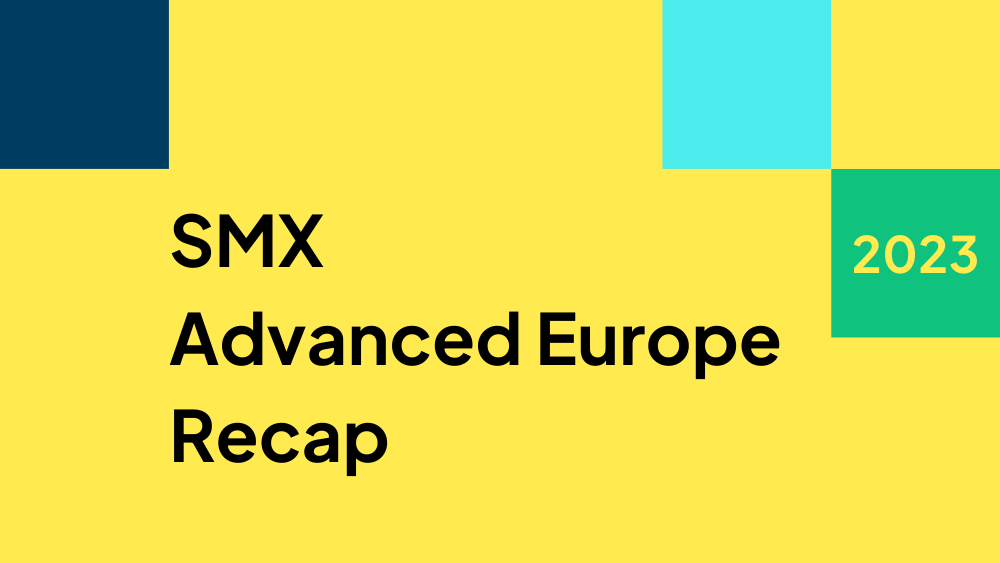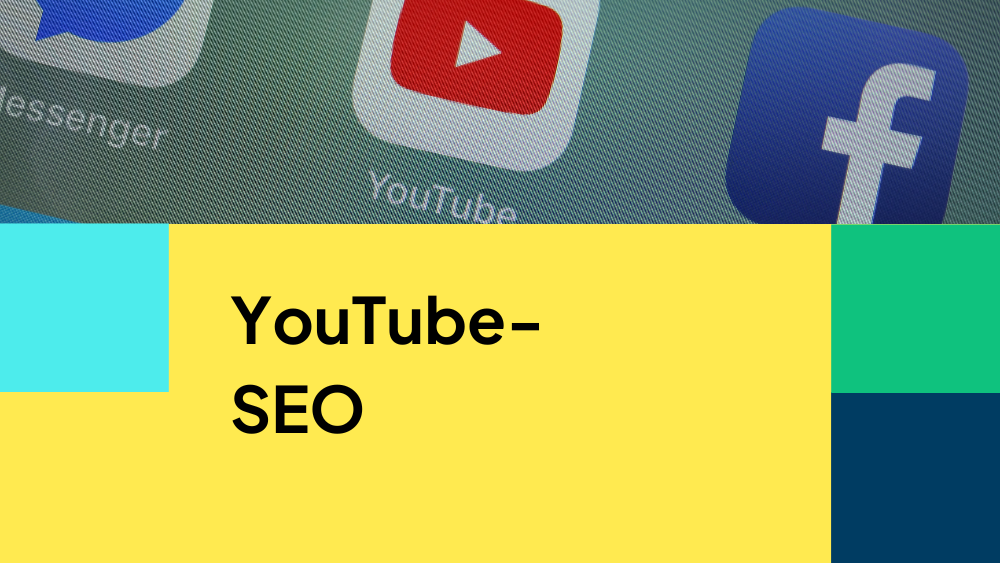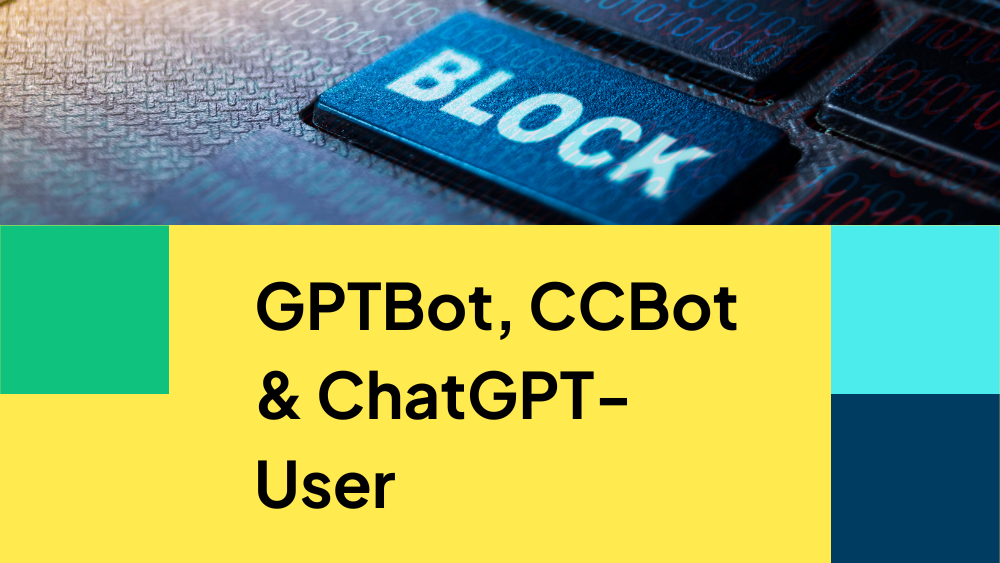Unser Recap zur SMX Advanced Europe 2023
21. September 2023
Vom 13.-14.09.2023 fand im Pullman Hotel Berlin Schweizerhof die SMX Advanced Europe statt – ein englischsprachiges Event, das sich an alle Search Marketeers mit Interesse an SEO und PPC richtet. Mit dabei war auch unsere Claneo-Expertin Cordelia, die nicht nur von der schönen Location und dem guten Essen vor Ort begeistert war, sondern auch von den spannenden Vorträgen. In diesem Artikel fasst sie ein paar der Vorträge zusammen und teilt ihre wichtigsten Learnings daraus mit.
André Morys (KonversionsKRAFT): Adapt or die – How to become a more resilient player in times of dynamic market conditions
- -10% order growth Q2 2023 > fight for conversions
- Is AI a chance or a threat? (Offene Frage an das Publikum, Handzeichen zur Abstimmung)
- How fragile is your company? > different players
- a) Non-digital natives (e.g. traditional offline stores)
- When making a decision, they need to be right more often than competition
- Hire the best people or a big consultancy to make the best decision
- They don’t need to be the best, often they pretend to be right
- > cheat recipe to be more right than competition
- a) Non-digital natives (e.g. traditional offline stores)
- Fixed mindset at scale: „I know what works best“ (power, status, risk aversion etc.)
- vs. b) Digital natives
- Growth mindset: „I don’t know what works best, but I will find out“/“I don’t know what works best, but I know how to find out“ (open-minded, curiosity, humbleness)
- vs. b) Digital natives
- Faith vs. Science
- Agile growth model
- Customer centricity –> really focus on solving cistomers problems; measure each step to know what works –> validated insights
- Examples comerzbank (problems of customers are not solved on the pages offered to the user) vs. booking.com
- Example Uber growth: apply scientific principles –> behavior change
- Beispiel Pricing & Anzeige von Produkten: es werden Produkte in einer bestimmten Reihenfolge angeboten (Preis absteigend vs. Preis aufsteigend) –> Frage an das Publikum: was funktioniert besser?
- Preis absteigend: Winner in revenue, but loser in conversion rate
- Lösung: Matrix für dich finden, was am besten funktioniert
- You can not fail, you only need to embrace failure to learn
- Experimentation/testing as a strategy
- Example Tesla Roadster
- Angeboten wurde den Kunden ein Tesla Roadster mit zwei Kaufoptionen
- a) Kaufpreis 250K: direkt 4k anzahlen, nach 10 Tagen 39k zahlen, später den Rest
- b) Kaufpreis 500k mit Unterschrift von Elon Musk, limitiert auf 1000 Stück und man muss eine Vorauszahlung leisten
- Option b) war innerhalb von 4 Tagen ausverkauft
- ABER: das Produkt Tesla Roadster gab es nicht mal physisch, es war ein Experiment
- Angeboten wurde den Kunden ein Tesla Roadster mit zwei Kaufoptionen
- Don’t start at the bottom (environment), start at the top (vision, purpose)
- Example Tesla Roadster
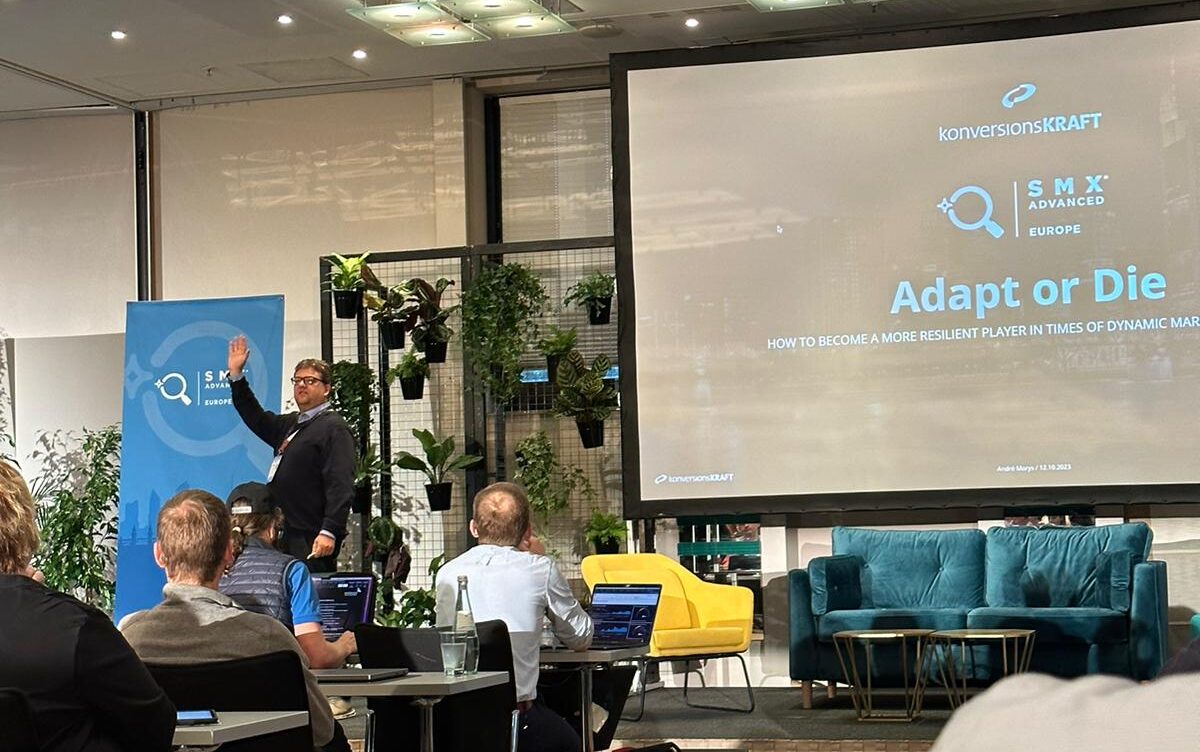
- Abb.1 André Morys während seines Vortrags „Adapt or die – How to become a more resilient player in times of dynamic market conditions“
Tom Anthony (SearchPilot): Entities are the past: search is going multidimensional
- Search is about to enter a new era
- Implicit context (location, time of day, language, search history) vs. Explicit context (search query like keywords & filters)
Keywords & Entities
- Keywords are head terms like „Shoes“ or longtail like „Sparkly blue kids shoes“
- Keywords are limited, no structures or relationships
- Entities introduced structure and relationships > represented by structured markup
- Entities can only represent some of the content
- Not all content can be marked up with structured data
- Example: Vacation website with an apartment listing, much of the site’s information cannot be mapped with structured data
- Name and address can be mapped, e.g.
- Not mapped can be e.g. number of persons, number of bathrooms, further information like wifi, air condition etc.
- Example: Vacation website with an apartment listing, much of the site’s information cannot be mapped with structured data
- Entities can represent limited context > entities & attributes must be predefined
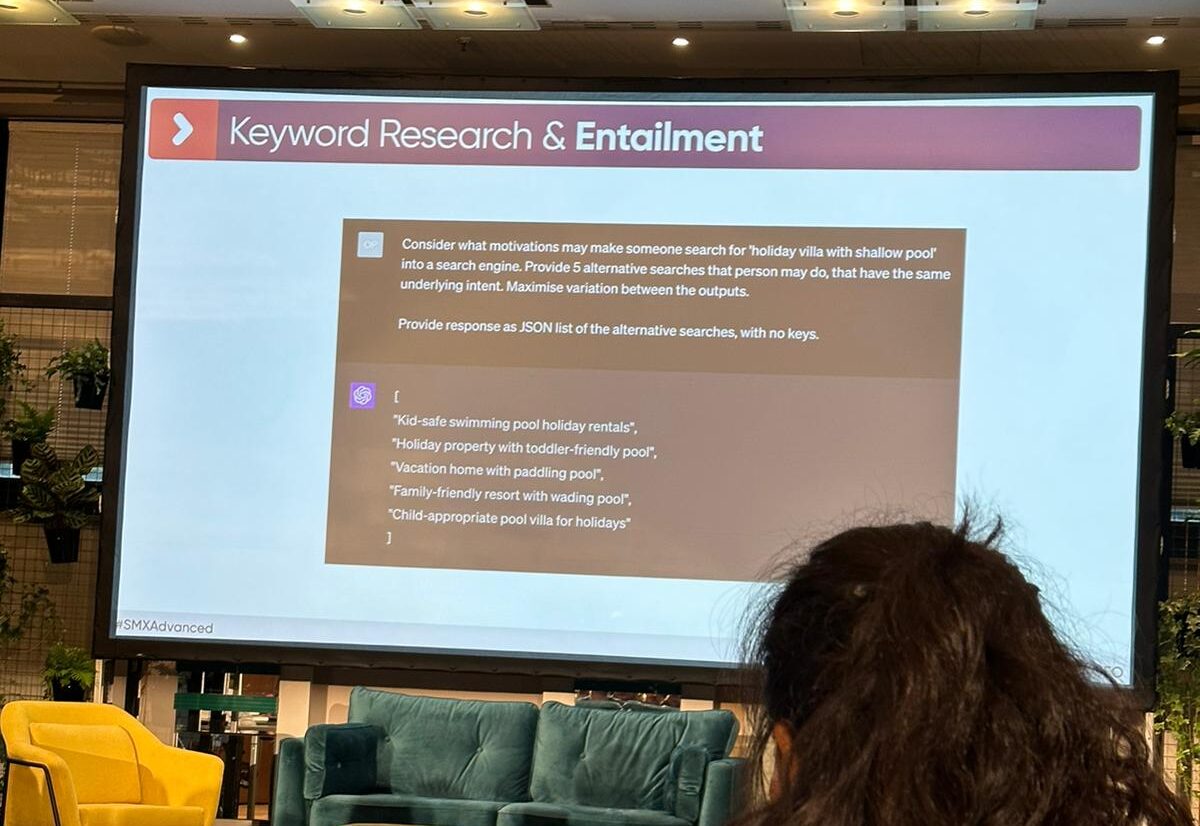
- Abb.2 Präsentation von Tom Anthony
- Modern search habits
- Ideal search: lots of explicit context
- vs. actual search: still 2-5 keywords
- Post-search browsing in Google > process of 4 steps
- Do search on Google
- Search through results > second phase of the same search; manually check for context
- Refine search on Google
- Repeat
- Search interfaces are still focused on keywords > limited explicit context in searches
Latent Spaces
- Building blocks for the next era
- Chat GPT
- Tom Anthony is not excited about chat function; he thinks we are not there yet to really use it
- He is excited about technology GPT: generative pre-trained transformer
- Promise of chat search: understanding context > comes from GPT part
- Bringing second phase into search engine understanding
- How GPT learns
- From natural language text
- Can learn different shapes of data
- Change is huge according to Tom Anthony
- Schema.org has 1,400 types
- GPT4 has 100,000,000,000 neurons > GPT form of learning is much advanced compared to schema.org
- Latent space is a vector space, where input data is encoded in a way the model learns automatically
- To understand nuances and knowledge
- Understanding relationships allows inferring context
- Example: search for toddler friendly pool
- Must understand that content on the website talks about safety
- Latent spaces can represent any attribute/relationship
- GPT models can learn any context
New era
- Google plans
- Scrape all content on websites to train AI
- Integrate Ai features to existing search engine
- The new search engines will attempt to anticipate user’s needs
- 2 impacts of GPT on search
- 1) How we search
- 2) How Google indexes
- 1) How we search
- Generates dynamic facets according to queries in SERPs
- Google wants to move away from 2-5 keyword searches
- Extended searches: by clicking a filter it adds/extends the original search queries (filter bubble below search queries)
- Generates dynamic facets according to queries in SERPs
- Context doesn’t need to be chat based > dynamic facets can provide explicit context
- The Latent Tail: the Long Tail’s big sibling > dynamic context makes the Long Tail look small
- 2) How Google indexes
- 2013: predicted structured data as „API“
- Natural language is the best „API“ in the context era
- Structured markup has been superseded
Learnings
- Current entities ability to represent explicit context is limited
- Current Google’s understanding of explicit context is limited, but rapdily improving
- GPT models can learn any context
- Latent spaces can represent any context > not constrained to a specific „shape“ of data
- Context doesn’t need to be chat based > dynamic facets can provide explicit context
- Structured markup no need to prioritize implementation, but also no need to delete it, it will just have reduced impact
- Tom Anthony recommends to „feed“ the GPT algorithm with context-rich text
- Keyword research & entailment
- EEAT becomes even more important
- GPT will explode Google’s understanding of context
- Chat interfaces are not necessary for increased context
- Prepare for a new Google Dance > we will see period updates
- Is a massive shift/opportunity in SEO
- We are trained for 20 years to type in 2-5 keywords in search > Google needs to incentivice us to change behavior and extend search
Questions
- Opinion on trend that a lot of big sites start blocking chatbot?
- For medical questions Google will be more hesitant and add safeguards on any type of specialism
- How good is my content in expressing all knowledge? > look at my own website; do in-depth searches which ones are used > test on ChatGPT to optimize own content
- We have first mover advantage now
Lily Ray (Amsive Digital): Let’s get real: advanced tactics for using AI tools and big data analysis to improve EEAT
- Issues with SGE/AI
- Subtle inaccuracies in ChatGPT > need a real expert to spot inaccuracies
- Copyright problems
- Cyber security concerns
- Issue with lags in training data
- Bing chat, webpilot, claude bard
- Lily asked ChatGPT: Let’s pretend you’re an SEO expert, what means EEAT?
- Since the training ended in 2021, ChatGPT does not know the first E and has to guess or gives 4 answers, including „Environment“; last answer was correct with „Experience“.
Learnings
- AI tools do not admit to NOT knowing something, only when cornered
- Just because AI content looks good doesn’t mean the content is actually good > you should apply an objective user test to see if the content is really helpful
- Danny Sullivan: Google is not interested in how content was produced, only whether it is of quality
- Core Update: AI Content > SI drop
EEAT
- Is indirect, not a direct ranking factor
- Only links and PageRank are direct EEAT factors
- EEAT matters more for YMYL sites
- Tip: always fact check AI content output (expert check) > backing up claims with evidence
- Use perplexity AI for sourcing and expert insights on the internet
- It’s for free
- Use perplexity to find sources to prove your claims and to source first-hand experience
- BUT: sharing first-hand experience is not first-hand experience
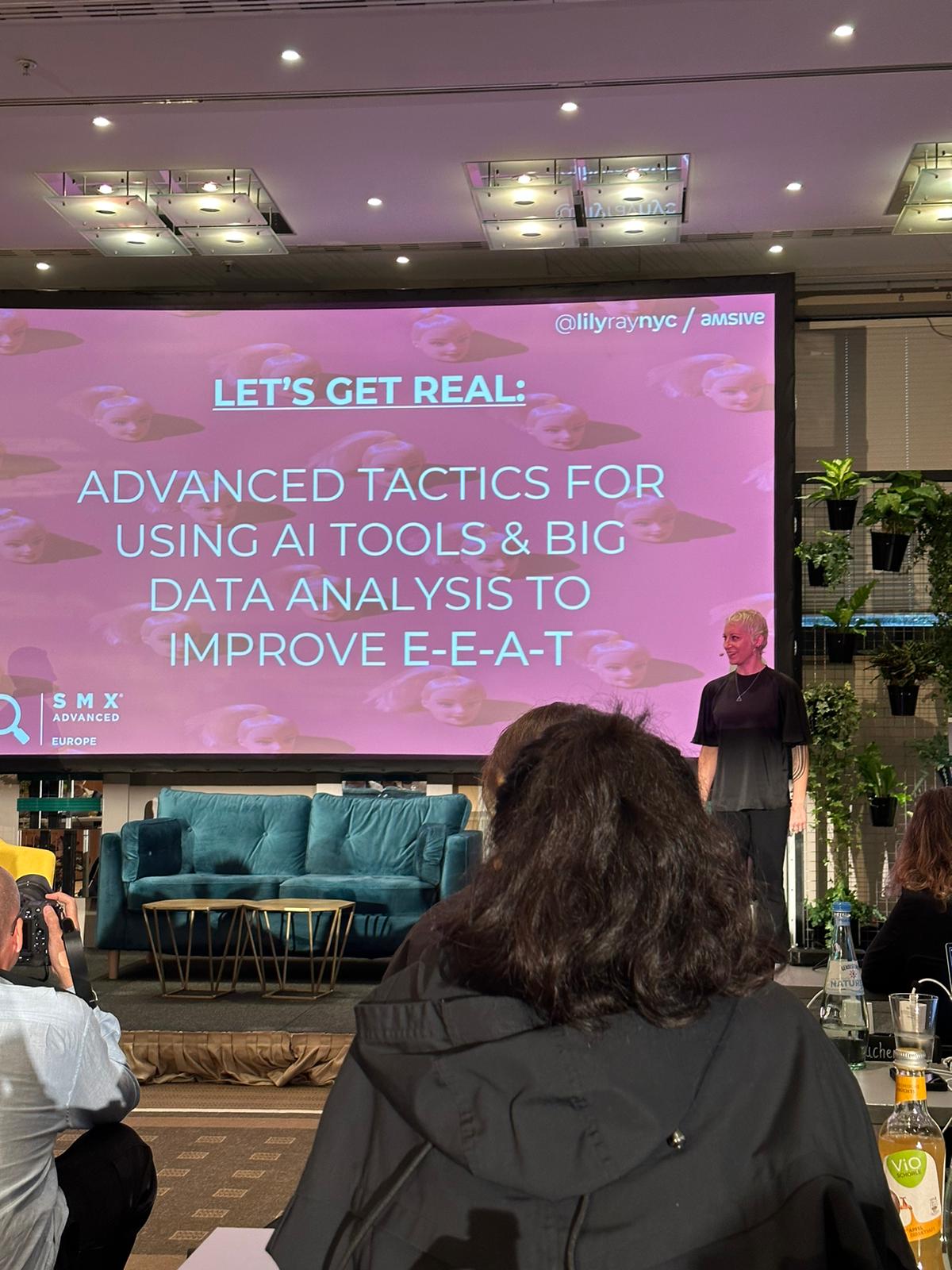
- Abb3. Lily Ray präsentiert ihren Vortrag „Let’s get real: advanced tactics for using AI tools and big data analysis to improve EEAT“
- Lily’s favourite: Claude, she also recommends to use Bing chat
- Using AI tools to compare
- Information gain score (net new info on the page)
- Use ChatGPT with webpilot to analyze various URLs
- Use Claude to analyze content from various sources
- Make a website into a PDF
- Analyse with Claude
- Example: Compare 5 sites: find similarities or differences > instant content analysis
- ChatGPT advanced data analysis (former code interpreter)
- Export Google Search data and use function
- Aggregate brand keywords and co-occuring keywords
- Use ahrefs author search function
- Use ChatGPT and webpilot to create a strong author bio
- Creates also HTML form
- You can create schemas too
- Improving authoritaviness on content
- Visualization
- Summarization + FAQs
- Custom instructions (tell ChatGPT about you)
- Other AI tools to explore: letterdrop, Harper AI, Copyleaks, AI content detector
- Optimizing SGE
- She used schema
- Situation: personal questions about her, not accurate answers to these questions in SGEs
- She posted information about herself on her website and after the update, the responses in SGEs were better because the SGEs pulled the responses directly from her site
- Direct answers to simple questions
- Her website as her own digital business card
